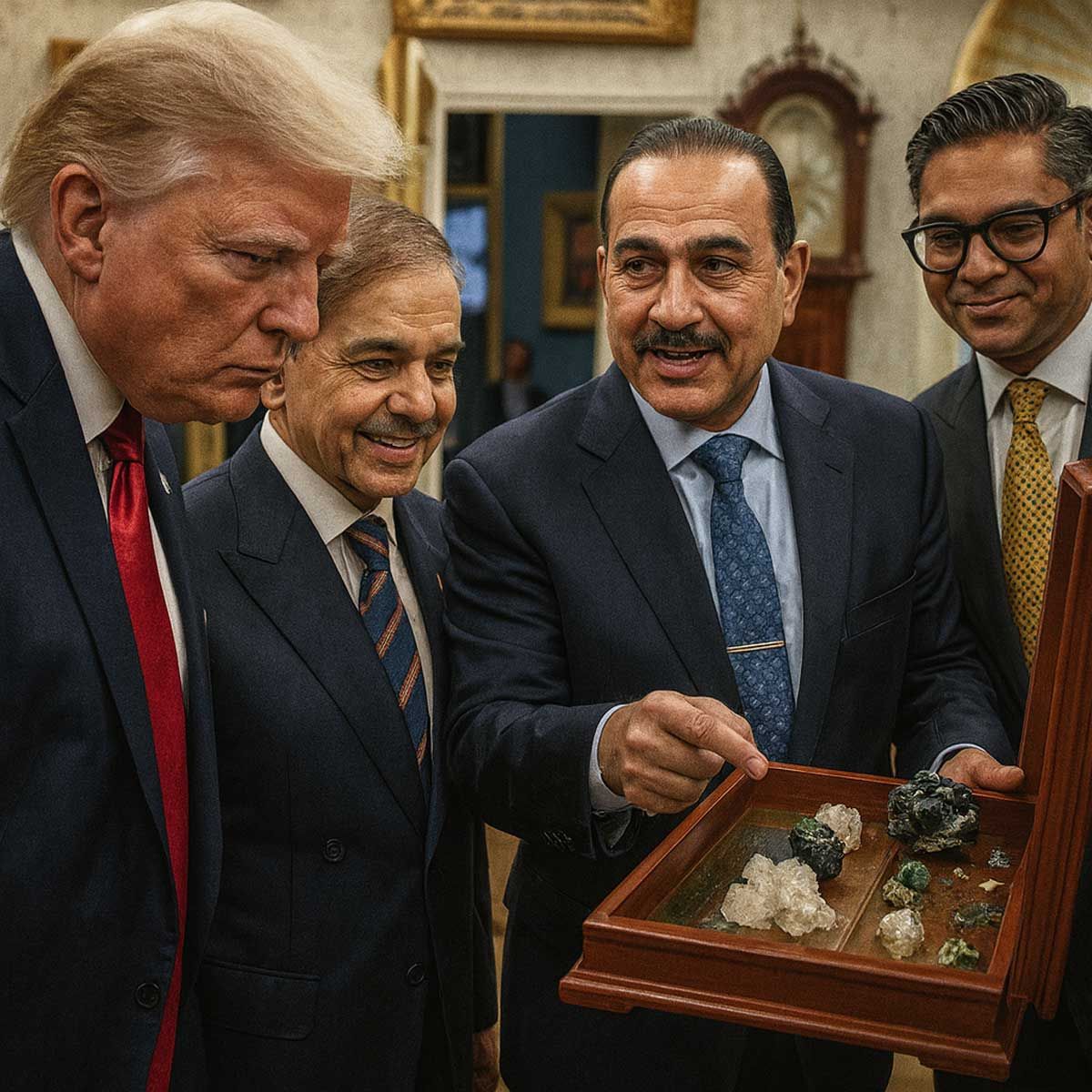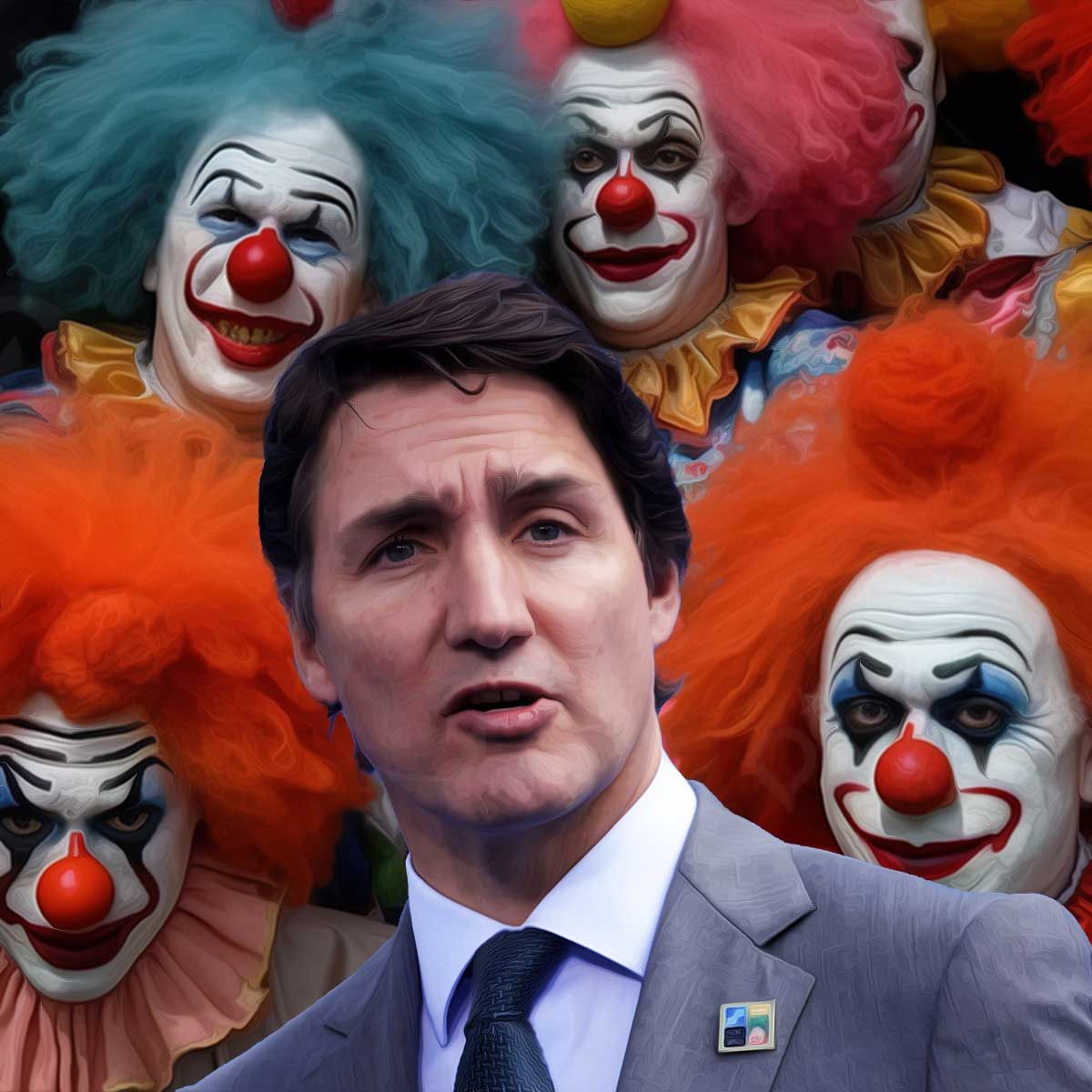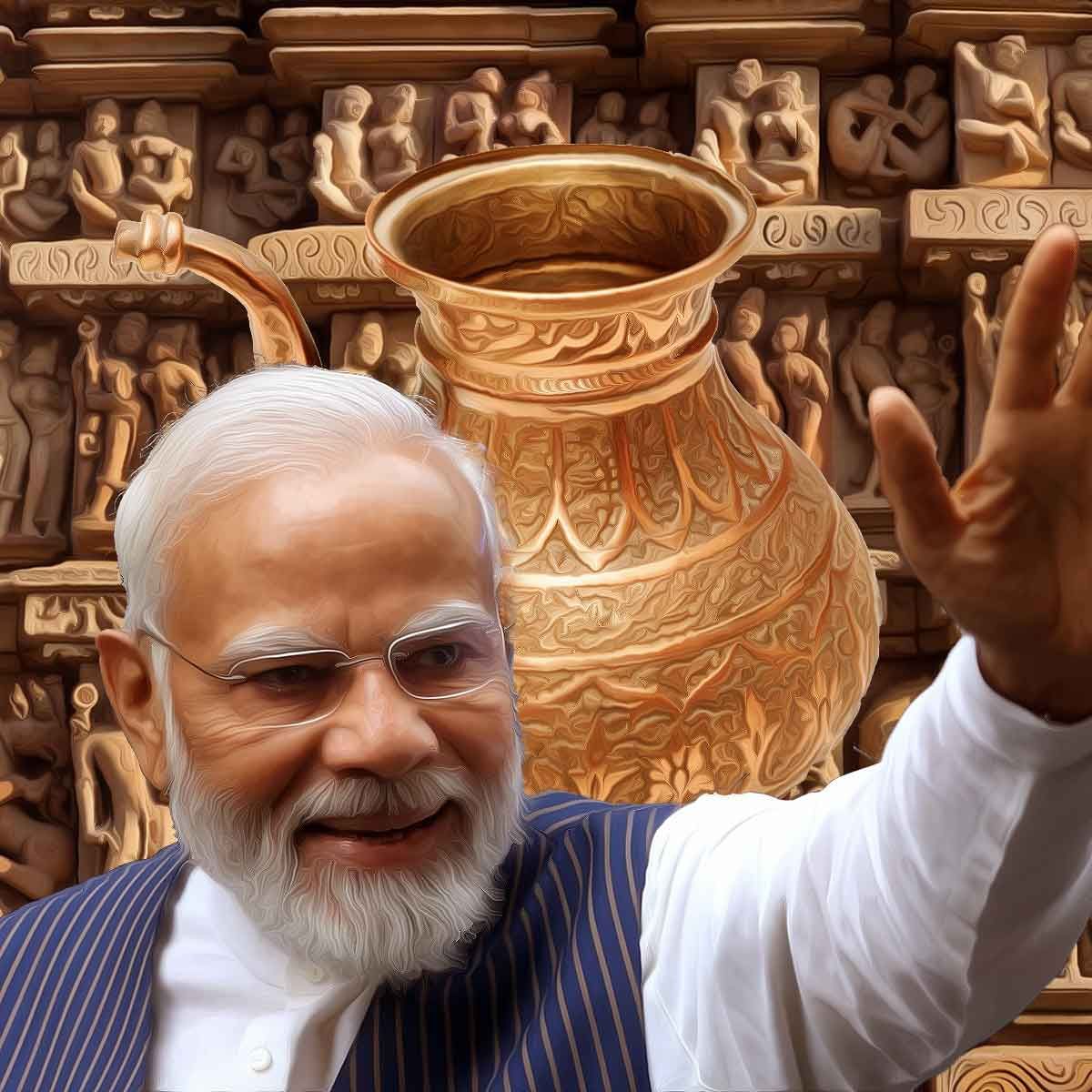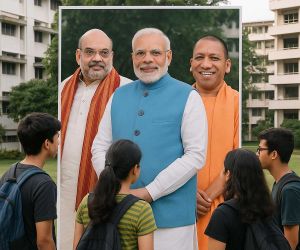MORE COVERAGE
Twitter Coverage
Satyaagrah
Written on
Satyaagrah
Written on
Satyaagrah
Written on
Satyaagrah
Written on
Satyaagrah
Written on
JOIN SATYAAGRAH SOCIAL MEDIA
As Trump receives rare earth minerals from Shehbaz Sharif and Asim Munir, Baloch rebels denounce stolen wealth, is the Trump-Pakistan nexus nothing more than illusion?

On 25th September, pictures from Washington showed US President Donald Trump sitting down with Pakistani Prime Minister Shehbaz Sharif and military chief Asim Munir. At this meeting, Munir presented a polished tray of what he described as “rare earth minerals.” The moment was clearly staged to impress the White House, with Pakistan hoping to project itself as a serious supplier of critical minerals and secure much-needed American investment.
This display was meant to show Pakistan as a player in the international race for rare earths. Yet, behind the glittering presentation lies an unsettling truth. Most of the minerals do not come from Punjab, the stronghold of Pakistan’s army. Instead, they are dug out of Balochistan, a region rich in natural wealth but long oppressed under harsh military control.
Baloch activists immediately condemned the images. They described the scene as a “theatrical attempt to sell stolen wealth,” accusing Pakistan of robbing their soil, parading it as their own, and trying to mortgage it to the US just as they had previously done with China.
|
The international contest for rare earth elements
Rare earth minerals are at the heart of modern technology and security. These 17 critical elements are essential for producing smartphones, electric vehicles, renewable energy systems, and even advanced weapons. Their demand is climbing rapidly, but reliable sources remain scarce.
Today, China controls most of the world’s rare earth production, creating deep concerns in Western capitals about supply security. It is this anxiety that Pakistan tried to exploit by showing off its so-called reserves to Trump. The offer was clear: invest in Pakistan’s mining sector and secure supplies of rare earth magnets, cobalt, and lithium.
However, this promise does not hold up to scrutiny. Trump himself has a history of bold pledges—like his vow to “bring prices down on day one”—that never fully materialized. Inflation stayed high, and the cost of daily goods like eggs and groceries kept rising. Similarly, grand promises of infrastructure revival largely stalled. In that light, Pakistan’s pledges on rare earths invite scepticism.
The deeper issue is that these resources overwhelmingly lie beneath Balochistan’s deserts and mountains, not in other provinces. For decades, Islamabad has exploited the region as if it were a colony—extracting wealth while leaving the local population impoverished.
|
Baloch voices – stolen wealth and bloodstained hands
The backlash from Baloch activists was swift and strong. Faiz M Baluch posted on X: “These thieves steal Balochistan’s resources and then pretend they own them. Don’t be fooled, Donald Trump, these military generals have blood on their hands. Stand with the victims, not the looters.”
Similarly, Mir Yar Baloch issued a direct warning, writing: “These samples of ‘rare earth minerals’ are being presented to you by Pakistan’s corrupt military chief Asim Munir. They are stolen from Balochistan during illegal mining. The Pakistan army has, at gunpoint, been illegally extracting these minerals and is now trying to portray them as Pakistan’s.”
For the activists, the picture was simple: Pakistan was like a thief offering stolen jewellery to a friend. They argued that if the US truly cares about justice and human rights, it must deal with the rightful owners—the Baloch people—instead of rewarding generals who silence dissent with violence.
|
A long history of exploiting Balochistan
This is not the first time Balochistan’s resources have been used as bargaining chips. From the natural gas fields in Sui to the gold and copper mines of Reko Diq, Islamabad has a long record of signing contracts with foreign powers while ignoring the voices of Baloch citizens.
Pakistan has already mortgaged Gwadar port to China, alongside surrounding resources, in deals that heavily favoured outsiders. At one point, rare earth magnets were even offered to the US as collateral for loans. Activists described these moves as nothing short of “auctioning” their homeland.
Earlier, Trump claimed Pakistan possessed massive oil reserves discovered in “Operation Sindoor.” Activists quickly countered that these reserves too were in Balochistan, not Pakistan’s central provinces.
In August, during an interview, Baloch leaders repeated their rejection of US overtures to Munir. They insisted that Balochistan is not merely a province but a nation under occupation, and warned Washington that courting Pakistan’s generals would only inflame anger among their people.
Why Washington is paying attention
The United States is actively seeking to reduce its dependence on China for rare earths. Trump has frequently spoken of securing critical minerals as a matter of national security. Any staged presentation of minerals is bound to attract attention in Washington’s corridors of power.
Pakistan understands this desperation and is now trying to place itself as an alternative supplier. But there are two major roadblocks. First, Pakistan lacks the infrastructure and governance to handle large-scale mining projects responsibly. Second, and most importantly, the minerals come from a land where the people have never given consent for such exploitation.
Balochistan’s refusal to sell its gold and minerals
The people of Balochistan have been resisting Islamabad’s extraction for decades. Whether through student protests or armed struggles, their consistent demand has been sovereignty and control over their own resources. Every new deal signed by Pakistan with foreign investors is seen locally as a pact sealed under the guns of the army, shadowed by enforced disappearances.
In his message to Trump, Mir Yar Baloch put it bluntly: “Would you prefer to accept, as a gift, a gold necklace stolen by a thief (Pakistan), or would you rather make friends with the legitimate owners (Baloch people) and lawfully earn thousands of gold necklaces?” The analogy spoke directly to the heart of the matter—accepting Pakistan’s minerals is the same as endorsing theft.
A bankrupt state’s desperate diplomacy
For Islamabad, the tray of minerals was more than a showpiece. It was a desperate call for dollars. Pakistan’s economy remains fragile, dependent on IMF bailouts and foreign aid. After exhausting China’s credit lines, the government now wants to persuade Washington that it has something valuable to offer.
But critics point out the obvious: the minerals do not belong to Pakistan’s ruling elite. They belong to Balochistan. Every dollar gained from their sale is money stolen from a region already torn apart by poverty, repression, and conflict.
What comes next
The coming months will reveal whether the United States accepts Pakistan’s narrative or acknowledges the grievances of the Baloch. If Washington chooses to side with Islamabad, it will be seen as an endorsement of occupation and suppression. Yet the world’s hunger for rare earths will only intensify as demand for green energy and advanced defence grows. That makes Balochistan’s resources more valuable than ever—and its struggle for justice more urgent.
Final word
Baloch leaders have left no room for doubt. The minerals presented in Washington do not belong to Pakistan—they are the rightful property of the Baloch nation. Any agreement struck with Islamabad, they say, is illegitimate and unsustainable.
For Washington and other global powers, the choice is now stark: will they continue to enrich a military elite accused of bloodshed and exploitation, or will they recognise the rights of a people who have endured decades of dispossession?
 Support Us
Support Us
Satyagraha was born from the heart of our land, with an undying aim to unveil the true essence of Bharat. It seeks to illuminate the hidden tales of our valiant freedom fighters and the rich chronicles that haven't yet sung their complete melody in the mainstream.
While platforms like NDTV and 'The Wire' effortlessly garner funds under the banner of safeguarding democracy, we at Satyagraha walk a different path. Our strength and resonance come from you. In this journey to weave a stronger Bharat, every little contribution amplifies our voice. Let's come together, contribute as you can, and champion the true spirit of our nation.
 |  |  |
| ICICI Bank of Satyaagrah | Razorpay Bank of Satyaagrah | PayPal Bank of Satyaagrah - For International Payments |
If all above doesn't work, then try the LINK below:
Please share the article on other platforms
DISCLAIMER: The author is solely responsible for the views expressed in this article. The author carries the responsibility for citing and/or licensing of images utilized within the text. The website also frequently uses non-commercial images for representational purposes only in line with the article. We are not responsible for the authenticity of such images. If some images have a copyright issue, we request the person/entity to contact us at This email address is being protected from spambots. You need JavaScript enabled to view it. and we will take the necessary actions to resolve the issue.
Related Articles
- At the White House, FBI Director Kash Patel shook hands with Pakistan’s Asim Munir as Donald Trump met Shehbaz Sharif, exposing tensions over Hindu identity and diaspora expectations
- After elevating a former ISIS leader in Syria and paving the way for Afghanistan’s fall to the Taliban, Trump cements ties with the region’s most notorious Islamic terrorists — Pakistan’s military — in a move blending power, risk, and geopolitical gamble
- Several countries including India, Japan, Australia, Taiwan, and Germany suspended parcel deliveries to the US after Trump ended the de minimis tariff exemption, disrupting global e-commerce, postal services, and millions of low-value shipments worldwide
- "Saddest thing about betrayal is that it never comes from your enemies": J&K Govt terminated Dr Bilal Ahmad Dalal and Dr Nighat Shaheen Chilloo for working with Pakistan to falsify post-mortem report of Asiya and Neelofar to falsely implicate Indian Army
- ‘Safety Valve Theory’: Purpose of founding Indian National Congress was to provide a safety valve to Indian nationalists to vent their frustration to avoid another situation like revolt of 1857
- On 16th Aug 1946, during Ramzan's 18th day, Direct Action Day aimed to provoke Muslims by mirroring Prophet Muhammad's victory at Badr, Gopal 'Patha', the Lion of Bengal, heroically saved Bengali Hindus & Calcutta from a planned genocide, altering history
- Operation Trident,1971: How Indian Navy Pulled Off One Of Its Greatest Victories over Pakistan, Karachi burned for seven days
- "जानता है रे मेरा बाप कौन है": Natasha Danish Iqbal's chilling smile after a deadly crash in Karachi kills a father and daughter, injuring others; her and CEO husband Danish Iqbal's pre-arrest bails expose power dynamics and stir public demand for justice
- Twitter rewards an Islamist org, set to be banned by India, with a verified blue tick: Here is what PFI has done in the past
- "Compassion has enemies, and those enemies are things like pity, moral outrage, fear": India calls on Pakistan to protect minorities after killing of Hindu woman Daya Bheel in Sindh province, her body was severed, breasts chopped and was beheaded
- ‘Jagdamba ki Jai Ho' words spoken by a wounded yet determined 2nd Lt Arun Khetrapal during 1971 Bharat-Pakistan war when he went on to destroy 10 Pakistani battle tanks: Youngest Param Vir Chakra Winner became eternal at 21
- Facing an economic crisis Nationalist Pakistanis are loathing Saudi Arabia, and they have solutions for all the obstacles: Nukes and opium
- "Traitors wear many masks but have only one face": J&K Bank's Chief manager, Sajad Ahmad Bazaz, sacked for shadowy ISI links, manipulating media with bank funds, and ties to extremist leaders, was planted for advancing the extremist-separatist ideology
- Muslim singer and model he/she/they Leo Kalyan sporting a beard on a dress performed at baby shower event of Bollywood actor Sonam Kapoor, who is expecting her first child with husband Anand Ahuja
- "Justice silenced breeds violence": While the US nudges Pakistan to probe church attacks in Faisalabad, the 'Riyasat e Medina' seems too busy juggling a crumbled economy and appeasing medieval mob passions. Modern times, but medieval priorities, perhaps?

























